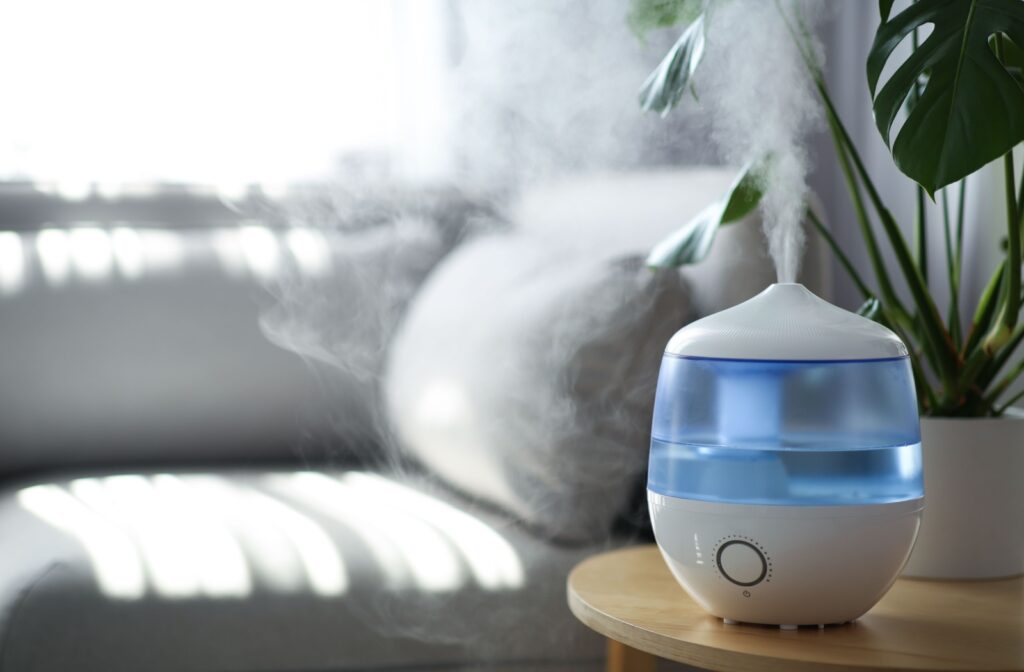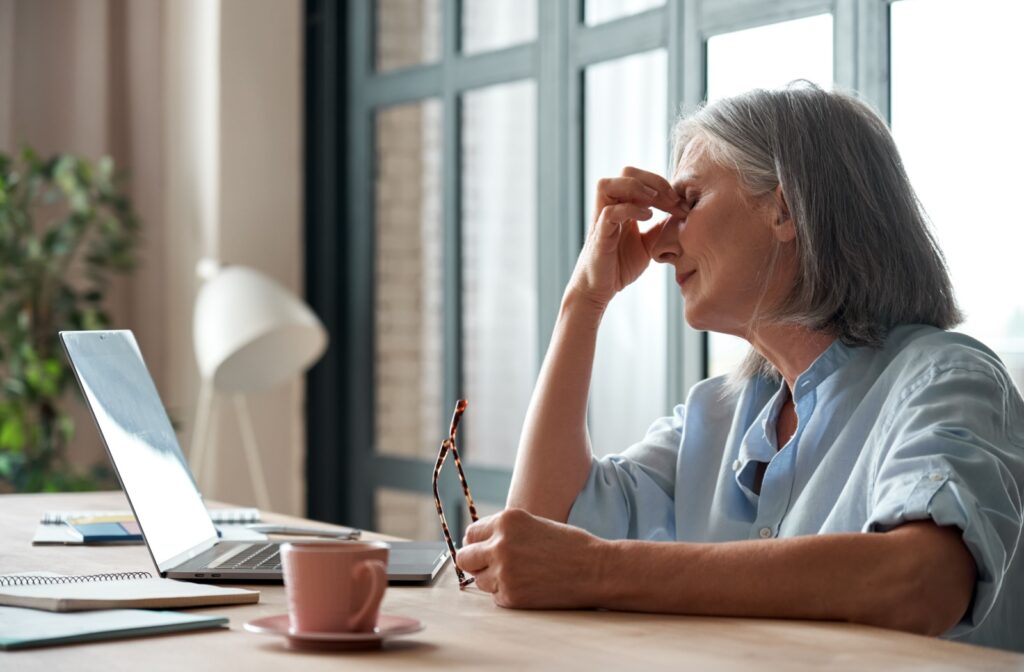Menopause is a significant transition that brings about many changes in your body. While you might expect developments like hot flashes or mood shifts, you may not realize that this life stage can also affect your vision and eye comfort. If your eyes have felt more irritated lately, this could be connected to your changing hormones.
Yes, the hormonal fluctuations that happen during menopause can directly contribute to developing dry eye symptoms. These changes can disrupt your body’s ability to produce healthy tears, leading to scratchy, burning sensations that interfere with your daily life. Understanding this link is the first step toward finding lasting relief.
The Link Between Hormonal Changes & Your Eyes
As you approach and go through menopause, your body’s hormone levels (particularly for estrogen and androgens) begin to decline. These hormones play a role in nearly every system in your body, including the complex one responsible for keeping your eyes lubricated. That’s why many women first experience dry eye discomfort at this point in their lives.
How Hormones Affect Tear Production
Your tears are made of more than just water; they have a delicate balance of oil and mucus, too. The oil layer, produced by small glands in your eyelids, is especially important because it prevents your tears from evaporating too quickly. A decrease in certain hormones can impact how well these glands function, leading to a less stable tear film and the frustrating symptoms of dry eye.
A Common Experience for Many Women
If you’ve noticed a change in your eye comfort during perimenopause or menopause, you’re far from alone. Studies show that a majority of women in this stage of their lives report symptoms consistent with dry eye disease. It’s a common part of the menopausal experience, but that doesn’t mean you have to just live with the discomfort.
Common Symptoms of Menopausal Dry Eye
Dry eye symptoms can show up in different ways, ranging from a minor bother to a significant disruption. Paying attention to these signals is important, as they can point toward an underlying issue with your tear quality. These feelings often worsen when you read, use a computer, or are in a dry environment.
What Do Menopausal Dry Eyes Feel Like?
You may notice one or more of the following sensations:
- A burning or stinging feeling
- Itchy or red eyes
- A gritty or sandy sensation, like something is in your eye
- Blurred vision that comes and goes
- Excessive watering or tearing—a sign your eyes are trying to compensate for dryness
- Discomfort while wearing contact lenses
How You Can Find Relief at Home
You can often manage mild dry eye symptoms by making small adjustments to your daily habits and surroundings. These simple strategies can help reduce irritation and support your overall eye comfort. Creating an eye-friendly environment can make a noticeable difference in how your eyes feel throughout the day.
Simple Changes to Your Environment
A few tweaks at home or in the office can provide significant relief. Try positioning your computer screen slightly below eye level to reduce the exposed surface area of your eyes.
Using a humidifier can add much-needed moisture to the air, and you can aim car or home air vents away from your face to avoid drying airflow.
Diet & Lifestyle Adjustments
Your diet and daily habits can also support your eye health. Foods rich in omega-3 fatty acids, like salmon and flax seeds, and vitamin A (found in carrots and leafy greens) can help support healthy tear production.
Remember to take frequent breaks from digital screens to rest your eyes, and make a conscious effort to blink fully and often.

Professional Dry Eye Treatments & Support
When at-home care doesn’t provide enough relief, it’s a good idea to seek professional support. A variety of treatments are available that go beyond basic artificial tears to address the root cause of your discomfort. Your eye doctor can work with you to find a solution that fits your specific needs.
Personalized Options for Your Comfort
Because every person’s experience with dry eye is unique, your treatment plan should be, too. A thorough evaluation can help determine the right approach for you. Common professional options include:
- Prescription lubricating eye drops
- Medications to help reduce inflammation
- In-office procedures to help your glands produce more oil
- Punctal plugs to help keep natural tears on your eye’s surface longer
When to Schedule an Eye Exam
You don’t need to wait for your symptoms to become unbearable before seeking help. A proactive approach is key to protecting your vision and improving your quality of life during menopause and beyond. Consistent eye care is an important part of your overall wellness journey.
Take a Proactive Approach to Your Eye Health
Regular eye exams are about more than just checking your prescription. During an exam, your eye doctor can carefully assess your tear film and the health of your oil-producing glands. This allows them to identify the specific cause of your dryness and recommend the most effective course of action.
Connect with an Eye Doctor in Chino Hills
Starting a conversation about your symptoms is the first step toward finding relief. Your eye doctor in Chino Hills can answer your questions, listen to your concerns, and guide you toward a management strategy that makes sense for you. You deserve to feel comfortable and see clearly through every stage of life.
At Total Vision Chino Hills, we’re here to help you navigate the changes that come with menopause and find relief from dry eye discomfort. Our team can provide a comprehensive evaluation and create a personalized plan to restore your eye comfort. Schedule a visit with us to get the support you need.





